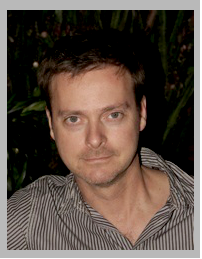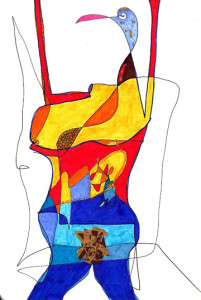Kathy Fish: Hi Christopher. In our email exchanges leading up to this interview, you mentioned to me that you really love writing and reading “wacky” stuff. I feel like we share this love! What draws you to the wacky and the weird? Do you feel that writing the weird is somehow less serious or important? Say no!
Christopher Allen: Kathy! Hi, you wonderful person. We definitely share a love for wacky. Some of my wackiest stories have never seen the light of day and probably never will. I love random, bouncing-off-walls Barthelmesque prose and definitely feel more freedom in stories that have elements of magic realism or absurdism. I write realistic stories populated by normal humans, but they don’t often find a publisher. This might be because it’s harder for me to avoid sentimentalism in a realistic story. Our emotions are pretty much the most important things we have, but if we as writers don’t bring something new to them it’s like a musician relying on a 1-4-5 chord progression and heart rhyming with new start. Predictability is comforting—that’s why commercial fiction makes so much money—but I love a surprise. Wacky is important.
I was once asked just how serious my book Conversations with S. Teri O’Type (a Satire) was, and my response was “nothing here is serious except everything.” The narrative relies heavily on humor—slapstick, camp, irony, bitchy sarcasm—but it ultimately implies something dead serious about how we allow our identity to be dictated by the expectations of others. Much of what I write plays with humor, but I don’t think I’ve ever written something humorous simply to be funny. It’s more likely that I choose a certain tone or voice to see the story from a unique angle, especially when it comes to familial relationships.
KF: Let’s talk about father/son relationships in your stories. My own stories explore sibling relationships a lot. Do you draw directly from life for these? Is there something you’re trying to work out through fiction? Do you feel it’s a basic theme of your writing that you will always be exploring in one way or another?
CA: I’ve noticed lately while putting together my first short story collection that a troubling number of my stories are about fathers and sons, so of course I’ve often asked myself why. My own father was away fighting a war the first few years of my life; that’s a fact we can’t change. Ours is an evolving, loving relationship. We don’t always agree, but there’s no one I respect more. My father is a good person with a generous heart. He’s a self-made man who’s never asked for anything but his own bootstraps, and there have been times when his bootstraps were all he had. I feel I need to say that, because over the years I’ve come to the conclusion that the fathers in my stories are not in fact my father. I think it’s a father within myself—or rather the father I’ve never been able to be—that I’m trying to find in my writing. Maybe I don’t know how to be a father, and that’s what I pound out again and again in fiction. That’s very personal, but I think most of my writing is—even if on the surface it’s humorous and playful.
KF: Your story for r.kv.r.y, “Wile E.”, is that kind of compelling wacky that I love. And there again, the father/son relationship. The father extols the virtues of the Road Runner, while the son admits he’d rather be Wile E. Coyote. As in all your stories, the ending is a stunner. I was very taken with (and surprised by) this line: “My father’s face contorts in practiced disappointment though he’s been dead since May.” Wow. As a reader, this one line cracked the story open and deepened it for me all at once. My question is, as you drafted the story, was that your intent from the get-go? Or had that notion surprised you, the writer, as well? And what does it mean for you, the writer?
CA: Thank you for loving the story and especially the ending, Kathy. I’ve struggled with them. A few years ago, I was so disappointed with my endings that I went to all of the AWP panels on endings (remarkably there were a few). I usually start with the end now, but I’m not sure if this is something I picked up from an AWP panel. I wrote the dialogue at the end for “Wile E.” first and wrote the story to get there. Ah, but then I revised the narrator’s action at the end: climbing into a cannon and lighting the fuse. That surprised me and excited me because it is of course exactly what the narrator would do. He wouldn’t learn from his mistakes. I was also surprised by the father being dead, so to answer your question, I didn’t know this when I started writing. The only bit I had to go on was the line “Because the artists always draw Wile E. another chance.”
As a person (maybe not a writer), I do feel that it’s better to be fortunate than to be gifted if you make a lot of mistakes. Maybe this is my own message to the universe. I’d like unlimited chances to get life right. I’d like to be able to get past regret.
KF: Another story that took my breath away is “The Ground Above My Feet,” published in Literary Orphans. What struck me is how you so subtly changed my mind about the father over the course of a scant few hundred words. And of course this is another father/son relationship tale. The father character is clearly an oddball and seemingly racist as hell. That opening! “You need a black lady.” And then, to discover later in the paragraph that the narrator was ten years old! We see, however, as the story proceeds that the father, misguided as he is, only has his son’s best interest in mind. There’s real tenderness there. It’s astonishing that there is so much funny/awful/sad/tender/real in such a short space. And again, you land the story in such a stunning, unexpected way. Again, I’m going to ask you: Did you see that ending coming yourself? What does the story mean to you? How many drafts did you go through, writing this?
CA: I love your questions. I’ll answer the easiest one first. I remember only tweaking this story, so maybe just two drafts with minor changes to tighten? I wanted this one to gather momentum toward that last paragraph, which always chokes me up when I read it because I’m the biggest sap ever and—although obviously I wrote it—I never see it coming. I knew the narrator was going to die (that the father would be standing on the ground above the narrator’s feet in the end), but I didn’t know before I wrote the ending how the father would react. I’m not sure I’d ever be able to read this one to an audience. I’d have to think of mashed potatoes or something to get through that last paragraph. There’s usually at least one thing my characters say that chokes me up and embarrasses me in public.
I wanted to take this father through exactly the arc you’ve described (so thank you for seeing that): sort of despicable, misunderstood, bumbling but likable, desperate, grieving. We can’t choose our parents, and of course this dad is a doozy. Despite his obvious shortcomings, the father in “The Ground Above My Feet” is a champion—maybe a failed one, but he’s still his son’s biggest fan. In the end, I want to give this dad a big hug. He does the best he can.
KF: I’m asking more questions than I should. Sorry for that! But I want to ask you about another story of yours: “One for Rainbow” recently published in Change Seven. I love the door of stories, the sublime oddness of yet another relationship here, this time a grandmother/grandson relationship. Rainbow is no ordinary grandma and it’s no ordinary relationship. In this story, the word “crucified” hits the reader like a nail through the heart. It’s so unexpected. It carries so much emotional weight for the story. I feel like this story is very layered with meaning, one I’ll come back to again and again. Can you talk a little about what brought you to this strange situation, these strange characters? And also, why the absence of a father comes in at the very end? Another example of you adding a detail that informs the entire piece. We do know he’s fatherless early on, but this line clobbered me: “…wondered if there was a father out there who’d want to know me.” And again, a brilliant closing.
CA: Thank you, Kathy. This is a difficult story for me. It evolved over the period of a year and went through lots of messy changes. It started with the idea of a child being too young to understand his grandmother’s big words, her trauma and her need to influence the child’s life with her age-inappropriate stories about deceit and heartache. It was supposed to be humorous, but draft by draft it went off in a more sinister direction. The details of “One for Rainbow” came so slowly, one every two or three weeks maybe. I’d be sitting in the train and think “Ah! Her hands need to be sticky!” Who knows why, but I thought about this story day and night for ages.
I toyed with the crucifixion image in a few stories before it landed in “One for Rainbow” It’s one of those situations where you know you have a compelling image but don’t know where it belongs. I’m so glad you feel it landed right. It feels right to me because it reinforces the grandmother’s violation of this child’s private space.
“One for Rainbow” is in part about a child who feels fatherless, but it’s also about a child who’s disappointed with his environment and his upbringing. Maybe this does say a lot about me. Maybe too much. Maybe just enough.
___________________________________________
Kathy Fish is on the faculty of the Mile-High MFA at Regis University in Denver. Additionally, she teaches two-week intensive Fast Flash© Workshops. She also serves as Consulting Editor for the Queen’s Ferry Press series, THE BEST SMALL FICTIONS. Her fourth collection of short fiction, RIFT, co-authored with Robert Vaughan, is available now from Unknown Press.Her stories have been published or are forthcoming in The Lineup: 20 Provocative Women Writers, Black Lawrence Press, 2015, Richard Thomas (ed.), Choose Wisely: 35 Women Up to No Good, Upper Rubber Boot Books, 2015, H.L. Nelson and Joanne Merriam, (eds.), Yemassee Journal, Elm Leaves Journal, Slice, Guernica, Indiana Review, Mississippi Review online, Denver Quarterly, New South, Quick Fiction, and various other journals and anthologies. She was the guest editor of Dzanc Books’ Best of the Web 2010. She is the author of a chapbook of flash fiction in the chapbook collective, “A Peculiar Feeling of Restlessness: Four Chapbooks of Short Short Fiction by Four Women” (Rose Metal Press, 2008), “Wild Life” (Matter Press, 2011) and “Together We Can Bury It” (The Lit Pub). Professional memberships: AWP and Pen America.
Christopher Allen is the managing editor of SmokeLong Quarterly. His fiction has appeared in Eclectica Magazine, Indiana Review, Night Train, Literary Orphans and over one hundred other journals and anthologies. He lives somewhere in Europe.



Pingback: “Wile E.” by Christopher Allen | Rkvry Quarterly Literary Journal